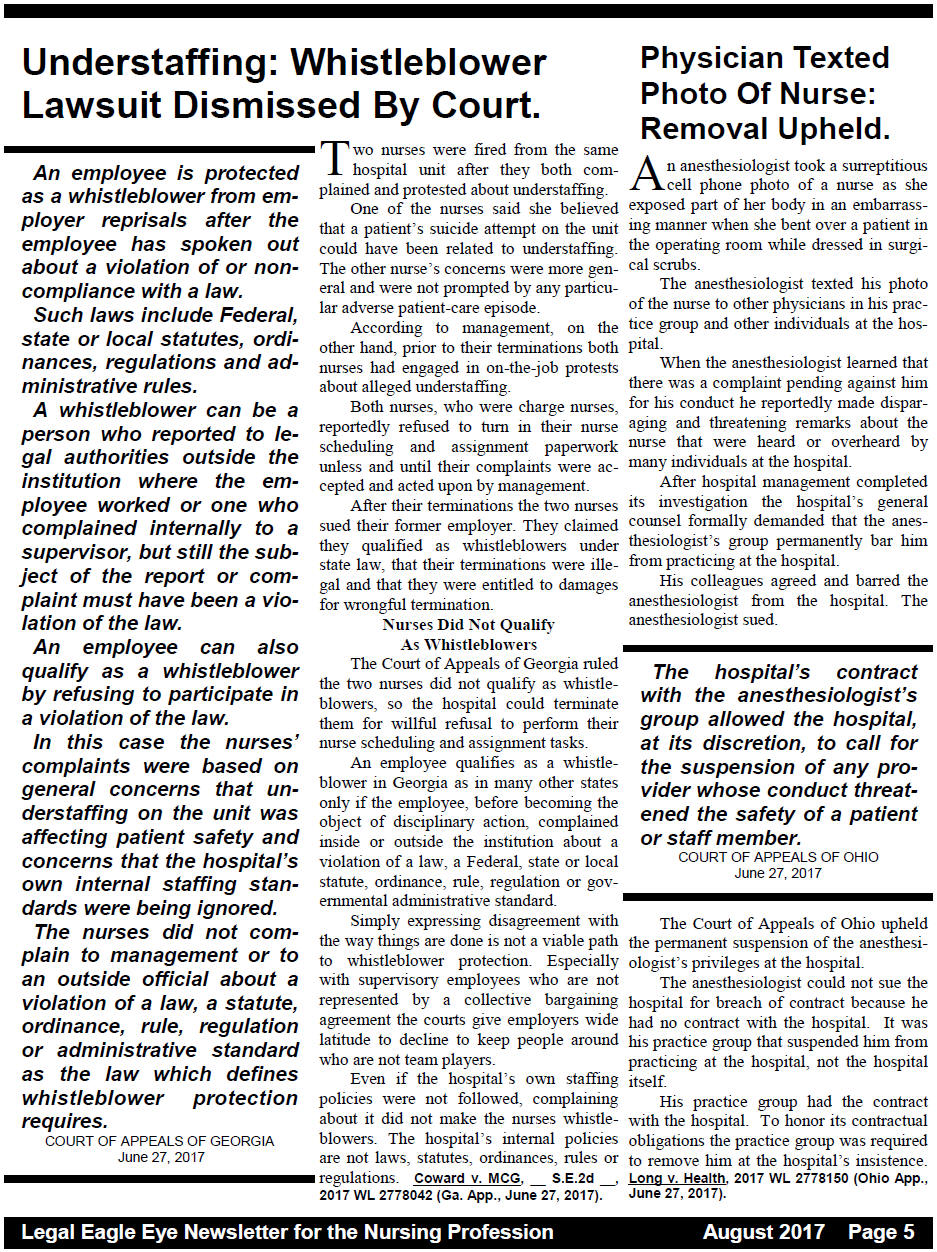Legal Eagle Eye Newsletter for the Nursing Profession Home Page
New Subscriptions I About Our Newsletter I Sample Newsletter I FAQ I Contact Us

Understaffing: Whistleblower Lawsuit Dismissed By Court.
An employee is protected as a whistleblower from employer reprisals after the employee has spoken out about a violation of or non-compliance with a law. Such laws include Federal, state or local statutes, ordinances, regulations and administrative rules.
A whistleblower can be a person who reported to legal authorities outside the institution where the employee worked or one who complained internally to a supervisor, but still the subject of the report or complaint must have been a violation of the law.
An employee can also qualify as a whistleblower by refusing to participate in a violation of the law. In this case the nurses' complaints were based on general concerns that understaffing on the unit was affecting patient safety and concerns that the hospital's own internal staffing standards were being ignored. The nurses did not com-plain to management or to an outside official about a violation of a law, a statute, ordinance, rule, regulation or administrative standard as the law which defines whistleblower protection requires.
COURT OF APPEALS OF GEORGIA June 27, 2017Two nurses were fired from the same hospital unit after they both complained and protested about understaffing. One of the nurses said she believed that a patient's suicide attempt on the unit could have been related to understaffing. The other nurse's concerns were more general and were not prompted by any particular adverse patient-care episode.
According to management, on the other hand, prior to their terminations both nurses had engaged in on-the-job protests about alleged understaffing. Both nurses, who were charge nurses, reportedly refused to turn in their nurse scheduling and assignment paperwork unless and until their complaints were accepted and acted upon by management.
After their terminations the two nurses sued their former employer. They claimed they qualified as whistleblowers under state law, that their terminations were illegal and that they were entitled to damages for wrongful termination.
The Court of Appeals of Georgia ruled the two nurses did not qualify as whistleblowers, so the hospital could terminate them for willful refusal to perform their nurse scheduling and assignment tasks. An employee qualifies as a whistleblower in Georgia as in many other states only if the employee, before becoming the object of disciplinary action, complained inside or outside the institution about a violation of a law, a Federal, state or local statute, ordinance, rule, regulation or governmental administrative standard. Simply expressing disagreement with the way things are done is not a viable path to whistleblower protection. Especially with supervisory employees who are not represented by a collective bargaining agreement the courts give employers wide latitude to decline to keep people around who are not team players.
Even if the hospital's own staffing policies were not followed, complaining about it did not make the nurses whistleblowers. The hospital's internal policies are not laws, statutes, ordinances, rules or regulations.
Coward v. Hospital, __ S.E.2d __, 2017 WL 2778042 (Ga. App., June 27, 2017).More from nursinglaw.com
http://www.nursinglaw.com/understaffed.htm
http://www.nursinglaw.com/understaffing-nurse-whistleblower.htm
http://www.nursinglaw.com/understaffiing-skilled-nursing.htm
http://www.nursinglaw.com/understaffing-nursing-home-management.pdf